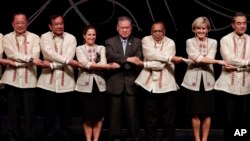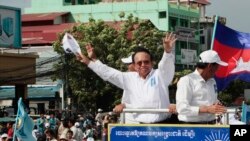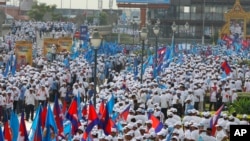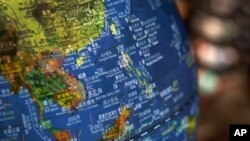China’s top diplomat, Wang Yi, met his Cambodian counterpart Prak Sokhonn during the Asean Regional Forum earlier this month, to send a clear message: Cambodia is under China’s protection.
According to a statement released by the Chinese Foreign Ministry, Wang expressed Beijing’s public endorsement of the general election on July 29, in which the long-ruling Cambodian People’s Party is claiming all 125 seats in the National Assembly with a voter turnout of about 83 percent – a figure provided by the National Election Committee.
“The Chinese side has always firmly supported Cambodia's efforts in safeguarding its sovereignty, independence, and stability and opposed any foreign forces interfering in Cambodia's domestic affairs, and will continue to provide assistance for Cambodia to maintain stability and development,” the statement adds.
Soon after the official result was announced on Wednesday, Chinese leaders Xi Jinping and Prime Minister Li Keqiang sent their letters congratulating Hun Sen for the triumphant election.
China’s endorsement and support for Cambodia’s ruling party comes amid mounting pressure from western democracies that have questioned the credibility of the election after a sweeping crackdown on political dissidents and the exclusion of the main opposition, the Cambodia National Rescue Party, which was controversially disbanded in November and saw 118 senior members banned from politics until 2022.
After the election concluded with the CPP announcing an overwhelming victory, the White House said that the poll was “neither free nor fair”, vowing additional measures against the Cambodian leadership.
Canada, Australia, Germany, the European Union, France, the United Kingdom and Sweden followed with similar statements condemning the election process and the prolonged jailing of CNRP President Kem Sokha, who is awaiting trial on treason charges.
One-Party Rule
The CNRP, with many of its senior members fleeing abroad fearing arrest, has called the election a “sham”.
Just a day after Sokhonn’s meeting with China’s Wang and citing “high” voter turnout, Prime Minister Hun Sen was quick to announce a new government would be formed in September.
Hun Sen said earlier this month that the new government and the National Assembly would be legitimate with the blessing of King Norodom Sihamoni and did not need approval from foreign powers.
After a meeting with King Sihamoni at the royal residence on August 7, Hun Sen said that the king would open the new parliament on September 5.
Hang Vitou, a Phnom Penh-based political commentator who leads the Young Analyst Group, said Cambodia was now firmly on track to become an entrenched one-party state.
“No matter what, there can be no other political party running Cambodia besides the CPP in this [five-year] electoral term and there is only him [Prime Minister Hun Sen],” Vitou said.
In an op-ed published by the leading pro-government newspaper Rasmei Kampuchea earlier this month, Environment Minister Say Sam Al, a member of the ruling party’s younger generation of leadership, said it would be a “democracy in the context of a single-party parliament”.
CPP spokesman Sok Eysan claimed that the country was still a multi-party democracy, despite the ruling party controlling every institution of government, from the National Assembly to the thousands of local commune offices.
“This result [on July 29] is also characteristic of multi-party democracy, reflecting the will of the people who vote despite being run by only one political party,” Eysan told journalists in a joint online news digest.
“This is only a special case in this sixth election. In the coming elections, other political parties can still join the democratic competition to grab the power from the CPP.”
China’s Support
The Foreign Affairs Ministry has dismissed Western criticism of the election. In a statement dated July 31, the ministry said the criticisms were “politically-motivated assessments”.
“Such an [approach] undermined the spirit of friendship and cooperation that has been enhanced thus far and cast doubt on the genuine sincerity to witness Cambodia further progressing in its irreversible democratization while enjoying the ‘longest peace in modern history’ and consistent sustainable development,” it said.
A number of countries have sent their congratulations on the electoral process, including China, Laos, Vietnam, Russia, and the Philippines.
China’s support now is more important than ever for Cambodia’s ruling elites, says Po Sovinda, an independent political commentator.
“No doubt, Cambodia will soon form a new government regardless of the condemnations ... by the West and the U.S.,” Sovinda says.
“China is and will always stand at the Cambodian side as long as Cambodia under the present leadership continues to be supportive of Chinese political and strategic positions in Asia,” he adds.
China has become the leading donor and investor in Cambodia. Its official development assistance – bilateral and multilateral – have so far met the government’s need for investment in infrastructure projects to sustain its economic growth.
“One way that China helps contribute to strengthening the legitimacy of the Cambodian People's Party in the aftermath of the election is through financial support,” Sovinda says, adding that the CPP may need to deal with Western pressure as well.
But the disagreement over the democratic process in Cambodia is already putting the country’s non-tariff export access under the Everything But Arms scheme to the E.U. market at risk. Cambodia’s exports to the E.U. reached about $5.8 billion in 2017.
In June, a “special mission” led by a prominent lawyer and government adviser, Sok Siphana, was tasked by the government to meet decision-makers in Brussels, justifying the crackdown as “internal issues” and seeking to rescue Cambodia’s trade agreement status.
An E.U. fact-finding mission also visited Cambodia in July to re-evaluate the Kingdom’s eligibility. This took place as the U.S. House of Representatives passed the Cambodia Democracy Act, urging the Trump Administration to impose targeted sanctions on Hun Sen and his inner circle.
Sek Sophal, a researcher at the Ritsumeikan Center for Asia Pacific Studies (RCAPS) in Japan, says that China is positioned to provide security to smaller countries like Cambodia in case of mounting international pressure to democratize.
“In the worst case scenarios, including the refusal by the international community to recognize the new government, or warnings of imposing sanctions like they say in previous statements, a small country may be able to find its way out if it can at least secure strong ties with an economic and military power [like China],” he said.
The extent to which China can step in in the case of the sanctions imposed by the West, however, is up for debate.
Bradley Jansen Murg, a professor of political science and Asian studies at the Seattle Pacific University, says China would not be able to replace the U.S. and the E.U. overnight as the destination of Cambodia’s garment exports.
“It's just not going to happen,” Jansen Murg said in an email.
“Cambodia's garment exports to China remain minimal, comprising roughly 3 percent of all garment exports. The market has simply not developed, despite the establishment of the Asean-China Free Trade Area (ACFTA) through which Beijing's tariffs for Cambodian garments/footwear dropped to nearly zero,” he added.
“There are simply not many tools at China's disposal to further support the Cambodian garment industry and offset the impacts of a suspension of [the EBA],” he says.
Xiong Bo, China’s ambassador to Cambodia, said during a lecture last month that the E.U. should not take political considerations into account when assessing Cambodia’s membership of the preferential trade scheme.
“So I think in terms of the trade relations between the EU and Cambodia, I think these trade relations should be conducted according to the economic and trade rules but should not be changed according to any political reasons,” Xiong said.
“No matter what the EU will do the Chinese will stand firmly in expanding and deepening our cooperation with Cambodia in all fields, especially in terms of trade and economic relations,” he added.
In return, China is seen winning Cambodia’s supports on some hotly-contested regional issues. On various occasion at ASEAN platforms, Cambodia is also endorsing China’s stance to not internationalize the South China Sea issues and to keep ASEAN’s hands out of the dispute.
A Political Solution?
The CPP has maintained that it has only been enforcing laws against “wrongdoing” by the CNRP leaders, but critics hit back that its actions were really due to the opposition’s rising political clout after the 2013 election and local elections in 2017, which posed a threat to the political establishment.
Vitou, the analyst, said it was time for political reconciliation and concessions, which would help de-escalate a confrontation with the West and avert any form of sanctions.
“The CPP needs to find a solution based on reason, not emotion. Stop the blame game … We feel the need to move forward by finding solutions as soon as possible.”











